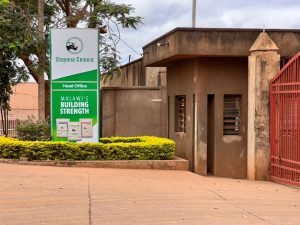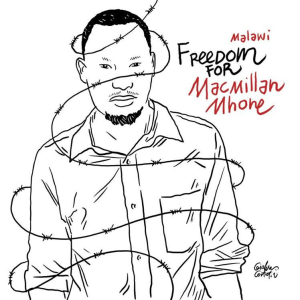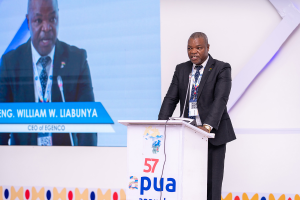FIREWORKS AT EGENCO
Government Instructs EGENCO to Transfer K350 Billion Kam’mwamba Coal-Powered Project to Indian Firm

Chikuni (c), Liabunya (r) and other EGENCO officials at an event
BY JACK MCBRAMS
Tensions are running high in Malawi’s energy sector over the contested future of the Kam’mwamba Coal-Powered Project. At the centre of this escalating conflict is the Secretary to the President and Cabinet (SPC), Colleen Zamba, locked in a standoff with the Electricity Generation Company (EGENCO). Adding complexity to the situation is the Principal Secretary for Energy, Alfonso Chikuni, whose involvement indicates the high-stakes nature of this disagreement. The contention stems from a monumental K350 billion initiative, a project poised to alter Malawi’s energy landscape significantly.
This strife is more than a mere corporate skirmish; it’s a pivotal moment that could define the nation’s energy policy and trajectory for years to come. The Kam’mwamba Coal-Powered Project isn’t just any infrastructure program; it’s a potential catalyst for change, capable of steering the country towards energy sufficiency, possibly impacting every sector of Malawi’s economy.
Yet, the path forward is mired in conflict. SPC Zamba’s position seems to be at odds with EGENCO’s vision, with Principal Secretary Chikuni’s role further complicating the dynamics. Each party’s motives and strategies remain under intense scrutiny, as the outcome of this dispute could set a precedent for how energy projects are handled in Malawi.
The nation stands at a crossroads, with the resolution of this conflict having far-reaching implications for its energy self-reliance, economic stability, and environmental stewardship. As the drama unfolds, all eyes are on the key players whose decisions will shape Malawi’s energy future.
Unveiling the Kam’mwamba Coal-Powered Project
Situated in Kam’mwamba, Zalewa, within the Neno District, the Kam’mwamba Coal-Powered Project is an ambitious 300-megawatt coal-fired power initiative spearheaded by EGENCO. This project, characterized by its soaring aspirations and inherent challenges, is a testament to Malawi’s commitment to bolstering its energy sector.
The backstory of this project is richly filled with dreams of harnessing sustainable energy and tackling the hurdles along the way. With so much at stake, the nation watches closely as the battle for control and direction of this venture unfolds.
Between 2019 and 2021, EGENCO embarked on essential feasibility and Environmental and Social Impact Assessment (ESIA) studies for the site. These investigations laid the groundwork for an ambitious goal: transforming Malawi’s predominantly hydro-based energy infrastructure. EGENCO’s intent was clear – transition from a 95% hydro-reliant power generation to a diversified 76% hydro makeup.
In 2012, the Chinese Gezhouba Group, a subsidiary of the China Energy Engineering Corporation, envisioned a US$500 million, 1,000-megawatt thermal plant in Malawi. This endeavour was planned in stages, with the first focusing on a 300-megawatt unit. The plant’s massive operation demanded nearly 400,000 tonnes of coal each year, procured from Moatize in Mozambique and transported via a railway network set up by Vale. This project loomed large, promising to be a cornerstone in the country’s energy sector.
By February 2022, the site’s groundwork was finalised and encapsulated by the feasibility and ESIA studies. Yet, the project was scouting for financial collaborators and builders. With a targeted launch in 2025, EGENCO was on tenterhooks, awaiting the nod from the Public Procurement and Disposal of Assets Authority (PPDA). A positive signal would enable them to partner with an eager investor, marking a pivotal phase in the venture. Come May 2023, with news buzzing about the refurbishment of the Kapichira hydroelectric plant, EGENCO diversified its focus, including a keen interest in the “Kam’mwamba coal-fired power plant in Balaka.”
However, by July 2023, the narrative took a twist. Even amidst a turbulent financial climate, EGENCO’s CEO expressed unwavering commitment to the project. While a feasibility study was ostensibly concluded, whispers from certain quarters suggested EGENCO’s consideration to revisit its strategy, potentially enhancing feasibility assessments for multiple endeavours, prominently featuring the Kam’mwamba Power Station.
JINDAL AFRICA ENTERS THE FRAY
Despite EGENCO’s persistent endeavours to secure investors for the coal-powered plant, a significant development emerged on April 29, 2023. Permanent Secretary for Energy Alfonso Chikuni in the Ministry of Energy initiated emailing EGENCO CEO William Liabunya, introducing Jindal Africa. This Indian conglomerate had expressed interest, leveraging an Independent Power Producer (IPP) framework, to take charge of the Kam’mwamba Coal Fired Plant.
Jindal Africa, a multi-faceted player with operations spanning South Africa, Botswana, Mozambique, Namibia, Zambia, Tanzania, and Madagascar, had stepped into the arena. Jindal Steel & Power, the prominent Indian steelmaker controlled by billionaire Savitri Jindal’s family, had a diverse portfolio encompassing sponge iron, mild steel, cement production, power generation, mining operations for iron ore and coal, and exploration for natural gas and oil. The company’s extensive capabilities were evident, suggesting a potential transformation of the Kam’mwamba project’s fate.
Chikuni, in his introductory email, urged Liabunya to “open an open dialogue to facilitate the transfer.” This transfer, detailed in a roadmap jointly developed by the Ministry and Jindal, outlined a series of activities. These activities included the handover of the Kam’mwamba Coal Fired Project to Jindal Africa, followed by the handover of the project site, the handover of the feasibility study and ESIA Reports, all scheduled between April 3 and April 14, 2023. The roadmap extended to include 12 additional activities, culminating in the commencement and completion of phase 1 of construction works in April 2026.
However, Liabunya’s response to the email was resolute. He expressed EGENCO’s continued interest in the national asset, objecting to the handover to Jindal Africa. Liabunya emphasised EGENCO’s substantial investment in the project since 2019, citing the employment and training of graduate engineers in India and an expenditure of over K5 billion on the feasibility study, ESIA, land compensations, and personnel emoluments.
Liabunya advocated for due process in engaging prospective investors as joint venture partners with EGENCO through the Public-Private Partnership Commission (PPPC). Using section 52 of the PPP Act, this approach would allow the commission to decide whether to permit prospective investors to join as partners in line with due process. He underscored EGENCO’s significant contributions to the project and its rightful claim as a partner in any future developments.
Liabunya also invoked the extensive public funds invested in the project, hinting at the potential need for reimbursement should the project proceed. The ownership and investments made by EGENCO further underscored its position in the decision-making process.
In a rejoinder email, SPC Colleen Zamba entered the fray. She emphasised the government’s role in providing the land for the project and expressed a desire to reclaim it. Zamba urged a focus on resolving any issues related to land additions. Liabunya, however, stood firm, reiterating the government and EGENCO’s significant contributions and the need for due process to safeguard national interests.
Liabunya objected to the handover of the project to Jindal Africa
EGENCO CEO AND COMPANY SECRETARY ON LEAVE
As this high-stakes battle unfolded, it became evident that the government was orchestrating a strategic move. Following EGENCO management’s refusal to cede the project to Jindal Africa, the government initiated actions against the company’s top brass.
On October 3, 2023, Secretary to the Treasury Dr. McDonald Mafuta Mwale, sent letters to Liabunya and Mluwira. The letters stated that EGENCO would undergo a forensic audit related to the damage caused by Cyclones Anna and Gombe, which disrupted the nationwide electricity supply.
Dr. Mwale further noted that, in keeping with proper corporate governance practices, both Liabunya and Mluwira would be placed on leave immediately to facilitate the auditors’ work. The reasons behind Liabunya and Mluwira’s suspension appeared multifaceted. In October 2022, Permanent Secretary Alfonso Chikuni had already raised concerns about alleged weak project management practices during the Kapichira emergency restoration project. Liabunya had attributed the delay to the government’s lack of support in securing loans for expedited repairs.
Yet, as the narrative unfolded, there was clear more at play. The government had appointed, on secondment, Dr. Maxon Chitawo from Mzuzu University as EGENCO’s director of operations and Dr. Gregory Gamula from the Malawi University of Business and Applied Sciences as director of planning. Dr. Chitawo, in particular, had been elevated to the role of acting CEO. It became evident that this reshuffling was part of a broader strategy, hinting at an orchestrated effort to change the power dynamics within EGENCO.
The email trail between Chikuni, Liabunya and SPC Zamba
EGENCO BOARD’S STANCE AND ABRUPT DISSOLUTION
In an interview with PIJ, a former EGENCO board of directors member provided insights into the board’s stance. Confirming their rejection of the proposal to transfer the Kam’mwamba project to Jindal Africa, the board member highlighted concerns about the legal aspects of the handover. Moreover, the absence of documents supporting the transfer, including crucial details regarding reimbursement for public funds, further complicated the matter.
This impasse prompted the board to withhold approval, refusing to greenlight the handover due to the paucity of supporting documents. The board’s resolute stance marked a critical juncture in the unfolding drama. Yet, little did they know that their fate would soon be sealed.
The board’s decision to withhold approval would prove to be their last, as Zamba, who chaired the board herself, abruptly communicated the board’s dissolution. In a swift and unexpected move, the board’s voice was silenced.
Chikuni says the government will offer the project to any private company with the technical and financial capabilities to implement it.
‘NO LAWS WERE BROKEN’: The Government’s Defence
In response to a questionnaire from PIJ, Chikuni, the Permanent Secretary for Energy, offered a robust defence of the government’s actions. He claimed that the Ministry of Energy had never offered the Kam’mwamba Coal-fired Project to Jindal Africa despite prior communications and the roadmap indicating otherwise. He clarified that the Ministry intended to offer the project to any private company with the technical and financial capabilities to implement it.
Chikuni firmly stated that the Kam’mwamba Coal-Fired Project had not been transferred to any private developer. Hence, he insisted that no procurement laws and guidelines had been violated. In his explanation, he highlighted that the Ministry could engage Independent Power Producers (IPPs) under unsolicited procurement procedures. This approach was feasible if the proposals met specific criteria, including being in the public interest, offering value for money, meeting efficiency metrics, responding to emergencies, and proving the technology’s effectiveness.
Chikuni acknowledged that EGENCO had used public funds for feasibility studies and other project-related activities. However, he underscored that the Ministry had yet to determine the amount of money EGENCO had spent on the project. The potential need for reimbursement if the project were to proceed was acknowledged. This aspect raised questions about handling the substantial public funds invested in the project. In this context, the Ministry of Finance and Economic Affairs would play a crucial advisory role as the entity responsible for managing public funds and a shareholder of EGENCO.
Chikuni further explained that in collaboration with the Chinese company Gezhouba Group Corporation (CGGC), the Ministry of Energy had expended resources on the initial feasibility studies and the associated Environmental and Social Impact Assessment studies. These studies provided free of cost to EGENCO, served as vital inputs for their work. The Ministry of Energy, with support from the Ministry of Lands, had also acquired land from the communities around Kam’mwamba for the project’s implementation and covered compensation expenses. Notably, EGENCO was not responsible for these compensations. The current title holder of the Land was the now-dissolved Kam’mwamba Power Generation Company—a company supported by the Ministry of Energy using the Rural Electrification Fund.
Chikuni concluded by raising an essential question: whether EGENCO would reimburse the government or the Ministry of Energy for the public funds expended on the project, should EGENCO decide to proceed with it. This question marked a pivotal point in the unfolding narrative, hinting at potential negotiations to safeguard national interests.
As the saga unfolded, efforts were initiated to obtain comments from key players involved in this high-stakes battle. SPC Colleen Zamba, Jindal Africa CEO Nitin Gupta, and Attorney General Thabo Chakaka Nyirenda were approached for their insights and perspectives. However, as we went to press, responses from these critical figures had not been secured. Their silence further underscored the complexity and sensitivity of the situation.





